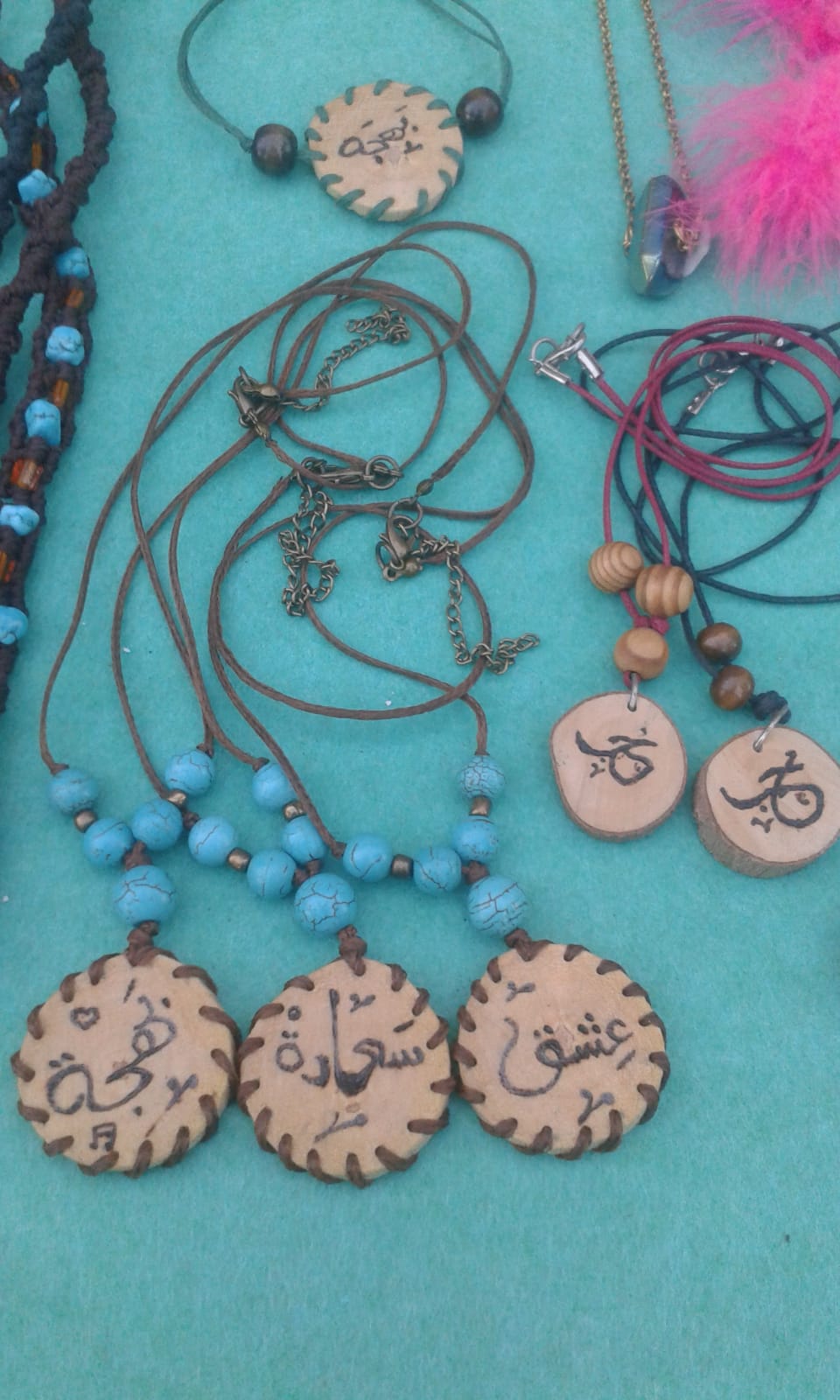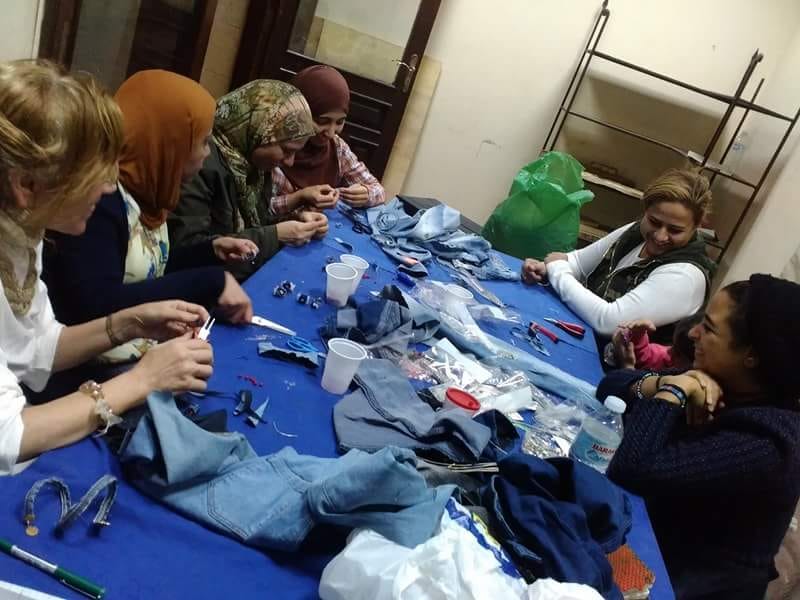Groundbreaking Workshop on AI and Technology-Facilitated Gender-Based Violence at AWiM24
Trending
Saturday May 31, 2025
Trending

Cairo
Have you ever thought that your wardrobe is piling pressure on our planet? Have you ever thought of the environmental cost of a single pair of jeans that you have? The cost of your clothes in the wardrobe goes beyond the mere price tag.
Our choice of clothing could be an expression of self-care. But, meanwhile, such self-care should not be at the expense of our environment which is grappling with the severe impacts of climate change, plastic pollution and biodiversity loss.
In light of growing environmental challenges, adopting nature-based solutions has become inevitable. SomeEgyptian women are now making strides in this regard by changing the fashion landscape.

Research and studies have revealed that fast fashion is one of the most polluting in the world. According to UN Alliance for Sustainable Fashion, around 215 trillion litres of water per year are consumed by the industry, bearing in mind that this amount of water is enough to meet the needs of millions of people.
This is worrying that this industry is responsible for an estimated 2-8 percent of the world’s greenhouse gas emissions besides accounting for approximately 9 percent of annual microplastic losses to the oceans.
According to the alliance, the clothing and textile industry employs 300 million people worldwide across the value chain and many of them are women. Therefore, women are also key actors in solutions.
The World Bank also indicated that the garment industry is responsible for 10 percent of annual global carbon emissions. This percentage is more than all international flights and maritime shipping combined. At this pace, the fashion industry’s greenhouse gas emissions are expected to further surge by more than 50 per cent by 2030.
Despite such gloomy figures, some solutions and alternatives can be adopted to reduce the numerous negative impacts of fast fashion, a matter that can change the landscape of this industry, making it more sustainable and eco-friendlier.
In Egypt, which will host the 27th session of the Conference of the Parties (COP 27), an increasing number of fashion designers started to embrace the concept of sustainable fashion.
A local female fashion and accessories designer Shaimaa Ismail, has been making strides since 2013 while considering the environmental aspect of all her products.
Ismail founded ‘ Zakzouka’ in 2013 with the key aim of making accessories out of recyclables. Later, she expanded her work by founding her own fashion brand “Soleil” to produce garments and dresses that are fairly made out of eco-friendly fabrics.
Ismail, who was suffering from depression, healed herself through the environment.
“The main goal of Zakzouka is recycling. I use recyclables to make home accessories, rings, bracelets and many more,” she said.
Ismail is also training other Egyptian women to help them earn a living while making eco-friendly products.
“I organised many workshops in different governorates nationwide including Alexandria, Fayoum, Siwa and Menofiya. Before travelling to any governorate, I conduct research on the types of waste in this governorate and the subsequent environmental problems like the burning of rice straw. In each governorate, I cooperate with development partners so we can gather women who aspire to start their businesses by making the best use of wastes,” she explained.
In her fashion work, Ismail is keen on displaying diverse entities and cultures while maintaining the ecological approach as environmental threats are global and not confined to a certain country or continent.
Ismail clarified that she uses natural fabrics such as certain types of cotton that are sustainable, renewable, and biodegradable. “Due to the low demand for such kinds of fabrics, the merchants export them. I import such eco-friendly fabrics from abroad though they are made in Egypt,” she added.
Meanwhile, Ismail pointed out that sustainable fashion has great economic potential. “Now, there is more awareness about climate issues. In addition, due to the severe temperature changes, clients now prefer natural fabrics rather than polyester,” she opined.
Last year, 10 different UN organisations established the UN Alliance for Sustainable Fashion during the UN Environment Assembly, which took place in Nairobi. Through this alliance, the UN seeks to breathe new life into the fashion sector by reducing its negative environmental and social impacts and turning it into a driving wheel for the implementation of the Sustainable Development Goals.
These previous steps go in tandem with the overall theme for UNEA-5, which is, “Strengthening Actions for Nature to Achieve the Sustainable Development Goals”. Boosting sustainable fashion falls on the third resolution adopted in the 5th UN Environment Assembly, focusing on nature-based solutions which include the required actions to protect, conserve, restore, sustainably use and manage ecosystems.
“Having a universally agreed definition of nature-based solutions is important. When countries and companies claim that their actions are supporting nature-based solutions, we can now begin to assess whether this is accurate and what it entails,” Inger Andersen, Executive Director of UNEP had stated.
Ahmed Fathy, UNEP Observer and Founder of Youth Loves Egypt Foundation (YLE) which is accredited by UNEP, stressed the paramount importance of reaching a legally binding framework to stem the tide of plastic pollution besides supporting nature-based solutions.
“It was agreed to establish an Intergovernmental Negotiating Committee to forge an international legally binding agreement to end plastic pollution. This is a milestone,” Fathy pointed out.
Fathy had organised a side event within the framework of UNEA-5. “This side event was held under the title ‘The Road to COP27’ as an attempt to mobilise and combine the efforts of UNEP-accredited civil society organisations. Promoting sustainable and nature-based solutions are part and parcel of YLE strategy,” he added.
The Forests4Fashion initiative is also one of the major initiatives that were launched in 2014 with the hope of initiating real change in the world of fashion by promoting sustainable forest management. According to the initiative, Modern wood fibres can be used to produce sustainable, renewable and biodegradable textiles, adding that there is a range of materials the fashion sector can use to reduce its ecological footprint.
In this regard, Dr Hussien Abaza, Senior Advisor to Egypt’s Environment Minister, stressed the importance of the Life-cycle assessment of products.
According to Dr Abaza, this process assesses the environmental impacts related to all stages of a product’s life including energy, water, materials processing, distribution and use.
All these stages should be eco-friendly, Dr Abaza added, “The lifecycle of the product should be longer. But, on the other hand, the fast fashion industry is always keen on attracting consumers to buy new products all the time. Such kinds of purchasing patterns are unsustainable. Life-cycle assessment of products should be given top priority,” he noted.
Dr Abaza, also pointed out the importance of sharing economy that stimulates sustainable practices. Sharing economy, he stated, is a solution to the negative impacts of fast fashion as it helps curb emissions, carbon footprints, pollutants and energy expenditure. In the fashion industry, sharing economy helps access the products that already exist instead of purchasing new ones
“In past, the environment was perceived as a barrier to development and private sector projects. This perspective is now being changed and we have to further support it. We have to focus on how to use the environment as an incentive for supporting GDP and SMEs besides encouraging the private sector to invest in this promising domain,” the environmental expert said.
This article is part of African Women (AWiM)/UNEP Africa Environment Journalism Programme
We’re not gonna spam. We’ll try at least.

Copyright 2020. African Women In Media
Copyright 2020. African Women In Media
Recent Comments